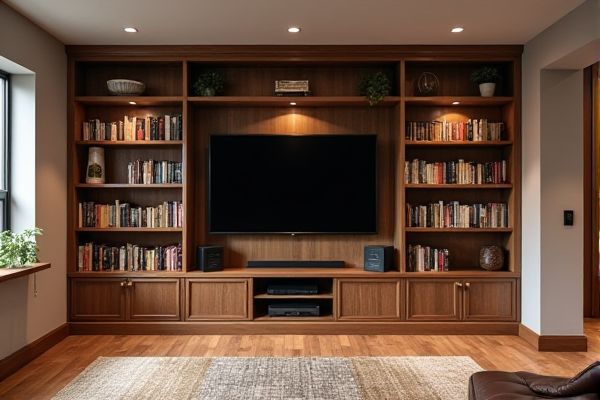
Media storage in the basement offers climate control and protection from light, preserving your DVDs, CDs, and digital devices better than traditional book storage, which may require different humidity and temperature conditions to prevent paper damage. Explore the full article to discover how to optimize your basement space for storing both media and books effectively.
Table of Comparison
| Criteria | Media Storage Basement | Book Storage Basement |
|---|---|---|
| Humidity Control | Essential to prevent data loss and device damage | Important to avoid mold and paper deterioration |
| Temperature Stability | Critical to maintain data integrity on disks and drives | Needed to prevent warping and yellowing of pages |
| Lighting | Low or no light to protect media from degradation | Adequate soft lighting for easy reading and cataloging |
| Storage Equipment | Anti-static shelving, protective cases for media devices | Bookshelves, acid-free containers for rare books |
| Security | High, to prevent theft of valuable media items | Moderate, to protect valuable collections |
| Ventilation | Required to avoid heat buildup and electronic failures | Important to prevent moisture and odor buildup |
| Space Utilization | Compact, stackable storage for discs, drives, and tapes | Vertical shelves for efficient book storage |
| Cost | Higher due to specialized equipment and environmental controls | Lower, mostly basic shelving and climate moderation |
Introduction: Media Storage vs. Book Storage in Basements
Basements offer unique challenges and benefits for storing media and books due to their temperature, humidity levels, and potential for flooding. Media storage in basements requires protective cases and climate control to prevent damage to CDs, DVDs, and digital drives. Book storage demands sealed, moisture-resistant shelves and dehumidifiers to preserve paper quality and prevent mold growth.
Space Efficiency: Shelving Solutions for Media and Books
Basement storage for media and books requires tailored shelving solutions to maximize space efficiency, with adjustable shelves accommodating varying sizes of DVDs, Blu-rays, and hardcover books. Compact, modular shelving units enable You to organize collections neatly while optimizing vertical and horizontal space, preventing clutter. Using dedicated media storage bins or bookends further enhances accessibility and protects items from basement humidity.
Climate and Humidity Control: Protecting Your Collection
Media storage in basements requires strict climate and humidity control to prevent damage to DVDs, CDs, and digital devices prone to mold and warping. Book storage demands stable temperatures and 40-60% relative humidity to avoid paper yellowing, brittleness, and mildew. Ensuring proper ventilation and using dehumidifiers or climate control systems can protect your collection effectively in a basement environment.
Organization Systems: Cataloging Media and Books
Efficient organization systems for media and book storage in basements rely heavily on tailored cataloging techniques to maximize accessibility and preservation. Media storage benefits from digital cataloging software that indexes formats like DVDs, Blu-rays, and vinyl, allowing quick retrieval. Your book collection thrives with categorized shelving and cataloging methods such as Dewey Decimal or genre-based systems, ensuring systematic organization and easy location.
Accessibility: Retrieving Items Easily in a Basement
Media storage in a basement often requires specialized shelving or waterproof containers to protect discs and electronics from humidity, while ensuring easy retrieval through labeled and organized compartments. Book storage demands sturdy, moisture-resistant bookshelves positioned at accessible heights to prevent strain when pulling volumes from lower or upper shelves. Incorporating proper lighting and clear pathways further enhances accessibility, enabling quick and safe access to stored items in a typically dim and confined basement environment.
Preservation Challenges: Media Formats vs. Paper Books
Media storage in basements faces significant preservation challenges due to vulnerability to humidity, temperature fluctuations, and magnetic fields, which degrade tapes, CDs, and DVDs faster than paper books. Paper books, while susceptible to mold, yellowing, and brittleness in damp basement environments, typically tolerate varying conditions better when stored upright and away from direct moisture sources. Employing climate control and protective enclosures is essential for both media formats and paper books to prevent irreversible damage in basement storage.
Security and Safety Considerations for Stored Items
Storing media in a basement requires climate control to prevent damage from humidity and temperature fluctuations, while books need stable conditions to avoid mold and paper degradation. Security features such as locked cabinets and surveillance systems protect valuable collections from theft or unauthorized access. You should prioritize a clean, dry, and secure environment tailored to the specific vulnerabilities of media or books to ensure long-term preservation.
Cost Comparison: Media Storage vs. Book Storage Setup
Media storage in basements typically demands higher initial costs due to specialized devices like digital servers, climate control units, and surge protectors to safeguard electronic content. Book storage setups are generally more cost-effective, requiring only sturdy shelving, moisture barriers, and basic lighting to maintain paper collections. Long-term expenses for media storage also include software updates and potential hardware replacements, whereas book storage mainly incurs occasional maintenance and pest control costs.
Aesthetic Approaches: Designing a Functional Basement Library
Designing a functional basement library involves balancing media storage and book storage through cohesive aesthetic approaches that maximize space and enhance visual appeal. Incorporating built-in shelving with adjustable compartments accommodates both books and various media formats, ensuring organized and accessible storage. Utilizing warm lighting, natural materials like wood, and minimalist design creates an inviting atmosphere that combines practicality with style in the basement environment.
Conclusion: Choosing the Best Storage for Your Collection
Selecting the ideal storage for your collection depends on factors like environmental control, accessibility, and space optimization. Media storage in basements requires moisture and temperature regulation to prevent damage, while book storage benefits from dry, well-ventilated conditions to avoid mold and paper deterioration. Prioritize climate control systems and organizational solutions tailored to your collection's specific preservation needs for optimal long-term care.
 homyna.com
homyna.com